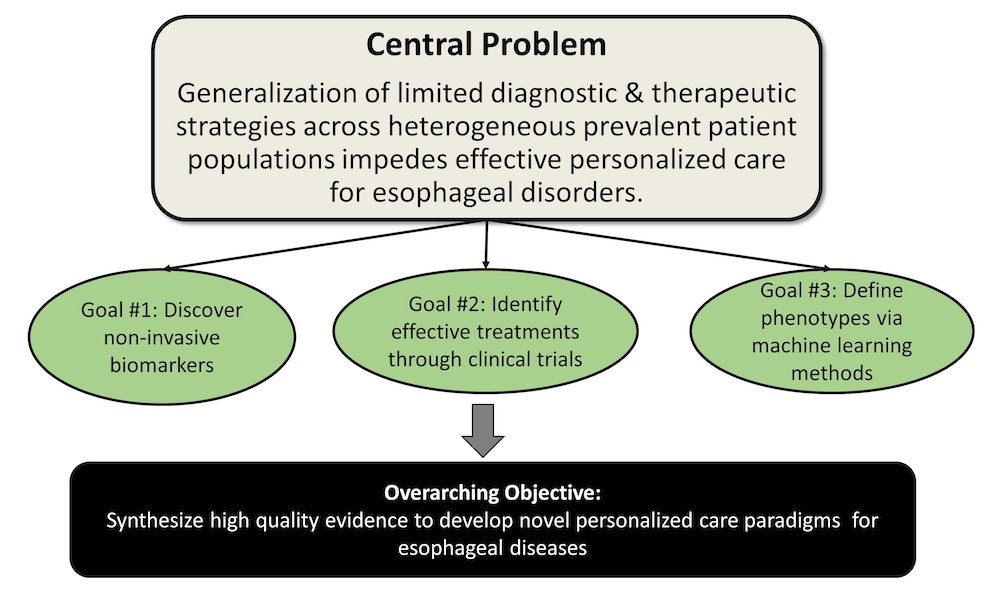Esophageal Diseases Clinical Translational Research Program
To discover novel care paradigms that are patient-centered, minimally invasive, and phenotype guided for esophageal diseases.
Principal Investigator
 Rena Yadlapati MD, MSHS is currently Professor of Medicine and Director of the Center for Esophageal Diseases at the University of California San Diego. Dr. Yadlapati completed her clinical gastrointestinal fellowship training at Northwestern University Feinberg School of Medicine where she became passionate about esophageal diseases and patient-oriented research leading her to pursue a two-year NIH T32 research fellowship in esophageal physiology and psychology and a one-year advanced fellowship in esophageal disorders.
Rena Yadlapati MD, MSHS is currently Professor of Medicine and Director of the Center for Esophageal Diseases at the University of California San Diego. Dr. Yadlapati completed her clinical gastrointestinal fellowship training at Northwestern University Feinberg School of Medicine where she became passionate about esophageal diseases and patient-oriented research leading her to pursue a two-year NIH T32 research fellowship in esophageal physiology and psychology and a one-year advanced fellowship in esophageal disorders.
Dr. Yadlapati feels that each patient with esophageal complaints is unique and that their care should be personalized using state-of-the-art technologies and team-based approaches to provide the highest quality of care. As such Dr. Yadlapati's research focus is on gastro-esophageal reflux disease and esophageal dysmotility, which has been supported by the NIH, American College of Gastroenterology (ACG), among others. She has authored over 100 peer-reviewed publications, much of which is incorporated into clinical practice guidelines. Dr. Yadlapati's national and international leadership includes serving as a co-author on numerous guidelines, leading international recommendations for esophageal diseases including the Chicago Classification version 4.0, and serving on the board of directors of the American College of Gastroenterology Institute.
Research Focus
Esophageal disorders including gastro-esophageal reflux, swallowing disorders such as achalasia, Barrett's esophagus, and eosinophilic esophagitis affects over one-third of the US population. There are tremendous research opportunities to improve the diagnosis and treatment of these prevalent conditions. Our clinical-translational research program is committed to the discovery of novel phenotype-guided paradigms for esophageal diseases.
Aims
The 3 overarching goals of our research programs are to:
- Discover minimally or non-invasive biomarker techniques that can accurately identify esophageal diseases,
- Understand the efficacy of therapeutic strategies in esophageal diseases through rigorous clinical trials and outcomes research, and
- Identify clinical-physio-psychological phenotypes of patients with esophageal diseases. Ultimately these data will inform guidelines and translate to clinical practice.

Research Sub-Programs
- Foregut Biorepository: Utilizes a variety of patient-derived biospecimens to facilitate study and validation of biomarkers and understand mechanisms of pathology
- Esophageal Registry: Enrolls patients with esophageal symptoms and collects clinical, physiologic and psychological variables
- Esophageal Clinical Trials Unit: Conducts a variety of investigator and sponsor initiated clinical trials studying the efficacy of diagnostic and therapeutic strategies for esophageal conditions
- GEODE: Gastro-Esophageal Oncogenesis, Dysmotility and Evolution
Recent Representative Publications
- Chicago Classification of Esophageal Motility Disorders
- Ambulatory Reflux Monitoring Guides Proton Pump Inhibitor Discontinuation in Patients With Gastroesophageal Reflux Symptoms: A Clinical Trial
- Diagnostic performance of salivary pepsin for gastroesophageal reflux disease.
- ACG 2020 Guidelines on Achalasia
- ACG 2020 Guidelines on Esophageal Physiologic Testing
News & Media
- Beyond PPIs for Persistent GERD
- Acid Exposure Reflux Monitoring Predicts PPI Discontinuation in GERD
- The path to becoming an esophagologist
- Podcast on Achalasia Guidelines
